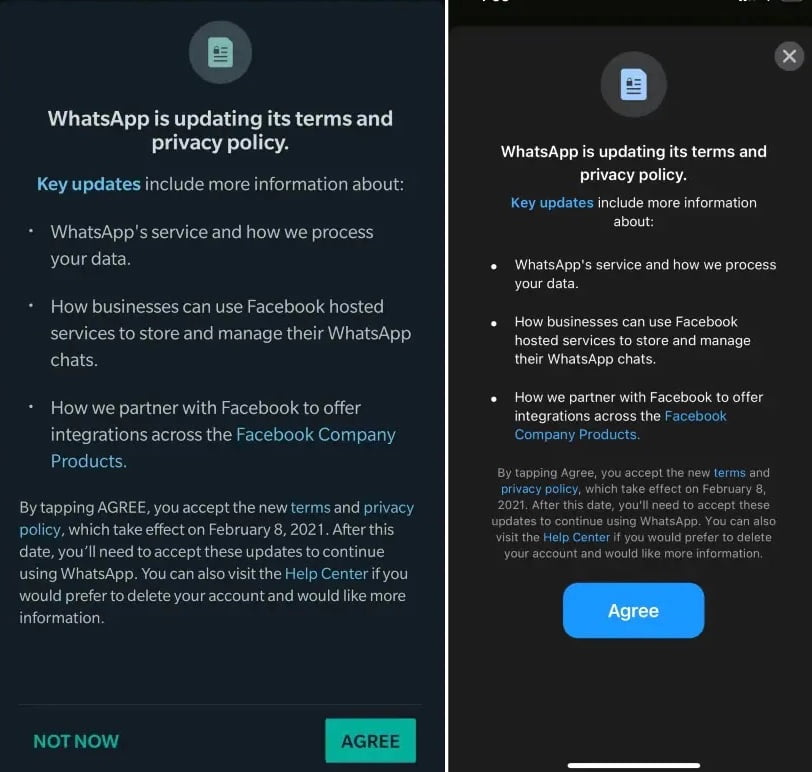WhatsApp will DELETE your account
WhatsApp will DELETE your account isn’t what everything seems. WhatsApp will NOT DELETE your account – Turns out it was a hoax after all.
WhatsApp will DELETE your account if you don’t accept new pop-up terms to share data with Facebook
WhatsApp is changing its privacy policy meaning sharing data with Facebook will be compulsory unless you want your account deactivated.
If users don’t accept the new privacy terms that pop up on their screens then they’ll lose access to their WhatsApp account from February 8.
Update your WhatsApp from the AppStore or PlayStore.

Many people have seen the new WhatsApp terms popup already and clicked ‘agree’ without fully reading the terms. The Facebook owned app is changing to help it integrate better with other services offered by the tech giant. Over the past 24 hours WhatsApp users have received a notice which tells them of the changes with the option of clicking ‘agree’ or ‘not now’.
The small print reveals that not agreeing before February 8 this year will result in your account being deleted.
WhatsApp has also made how it handles and collects data more transparent and new sections in its privacy policy include ‘Transactions and Payments Data’ and how it handles ‘Location Information’.
The WhatsApp website now has a section that answers ‘What information does WhatsApp share with the Facebook Companies?’.
It states: “WhatsApp currently shares certain categories of information with Facebook Companies.
“The information we share with the other Facebook Companies. includes your account registration information (such as your phone number), transaction data, service-related information, information on how you interact with others (including businesses) when using our Services, mobile device information, your IP address, and may include other information identified in the Privacy Policy section entitled ‘Information We Collect’ or obtained upon notice to you or based on your consent.”
The updated policy also suggests that you may receive marketing material about Facebook Companies.
The move could be another step towards Facebook, WhatsApp and Instagram eventually integrating as one.
WhatsApp – a quick history
Here’s what you need to know…
- WhatsApp was created in 2009 by computer programmers Brian Acton and Jan Koum – former employees of Yahoo
- It’s one of the most popular messaging services in the world
- Koum came up with the name WhatsApp because it sounded like “what’s up”
- After a number of tweaks the app was released with a messaging component in June 2009, with 250,000 active users
- It was originally free but switched to a paid service to avoid growing too fast. Then in 2016, it became free again for all users
- Facebook bought WhatsApp Inc in February 2014 for $19.3billion (£14.64bn)
- The app is particularly popular because all messages are encrypted during transit, shutting out snoopers
- As of 2020, WhatsApp has over 2billion users globally
Shortly after Facebook acquired WhatsApp for $19 billion in 2014, its developers built state-of-the-art end-to-end encryption into the messaging app. The move was seen as a victory for privacy advocates because it used the Signal Protocol, an open source encryption scheme whose source code has been reviewed and audited by scores of independent security experts.
In 2016, WhatsApp gave users a one-time ability to opt out of having account data turned over to Facebook. Now, an updated privacy policy is changing that. Come next month, users will no longer have that choice. Some of the data that WhatsApp collects includes:
- User phone numbers
- Other people’s phone numbers stored in address books
- Profile names
- Profile pictures and
- Status message including when a user was last online
- Diagnostic data collected from app logs
Under the new terms, Facebook reserves the right to share collected data with its family of companies.
“As part of the Facebook family of companies, WhatsApp receives information from, and shares information with, this family of companies,” the new privacy policy states. “We may use the information we receive from them, and they may use the information we share with them, to help operate, provide, improve, understand, customize, support, and market our Services and their offerings.”
In some cases, such as when someone uses WhatsApp to interact with third-party businesses, Facebook may also share information with those outside entities.
The move comes a month after Apple started requiring iOS app makers, including WhatsApp, to detail the information they collect from users. WhatsApp, according to the App Store, reserves the right to collect:
- Purchases
- Financial information
- Location
- Contacts
- User content
- Identifiers
- Usage data and
- Diagnostics
A WhatsApp spokeswoman declined to speak on the record about the changes and precisely how or if it’s possible for users to opt out of them. She agreed to email additional information on the condition it be kept on background, meaning none of the details can be quoted verbatim.
The move, the spokeswoman said, is part of a previously disclosed move to allow businesses to store and manage WhatsApp chats using Facebook’s infrastructure. Users won’t have to use WhatsApp to interact with the businesses and have the option of blocking the businesses. She said there will be no change in how WhatsApp shares provides data with Facebook for non-business chats and account data.
Together, the WhatsApp privacy policy and terms of service are more than 8,000 words long and are filled with legal jargon that makes it difficult for non-lawyers to understand. WhatsApp is doing its users a disservice by not agreeing to speak on the record so that reporters can fully understand the changes and explain them to readers.